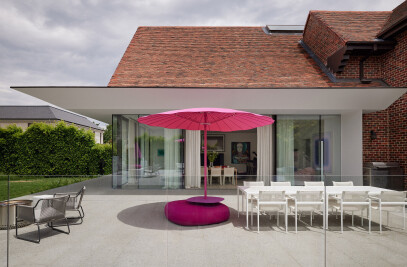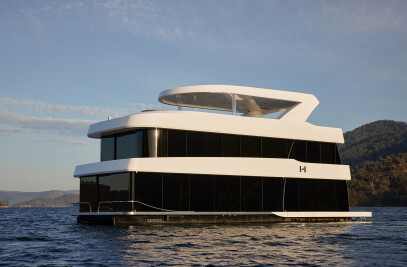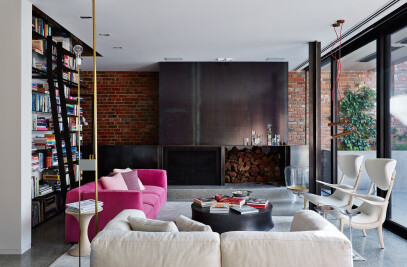Alto embodies a conscientious response to the theme of modern meeting traditional, often seen in Melbourne’s inner suburbs. Responding to this design language, the house nestles into its setting with a folded form that mimics the elbowed site. Jolson’s approach to the rich historical cul de sac location elevates the programme for a heritage home to meet the needs of a modern family. The gesture of the fold flows through the interior spaces in dialogue with the architecture, contrasting graphic elements which offset the ornate.


The significant renovation retains the features which bind it to its neighbours, though beyond the familiar red brick, an irregular play of window forms and verdant garden is a layering of texture and modernisation subtly gradated throughout the home. The interplay between existing and new begins from the first glimpse on approach. The original front door has been reinstated, re-characterised with an oversized front step to amplify the arrival sequence. A semi-circular opening in the entry canopy imitates the arched window it surrounds, offering a shady place for a potted plant to reach tendrils up towards the sky.


Inside this threshold, the arrival space is full of light. Jolson’s double height void has been crafted to allow a moment of harmony between new and old where the spiral stair is a simple gesture to complement the original windows, held off the walls to create a meaningful interaction through its separation. A nuanced shift is felt between the natural light from the windows and that from new fittings pinned off the wall. These bold fittings mimic the play of natural light in this space, directed to bounce off the walls in such a way that the two qualities blend, indistinguishable from one another.


While the interiors are pared back relative to the ornate architectural features, a different style of detailing is layered through a textured palette of finishes and furnishings. Generous swathes of linen pool on the floorboards, their fluidity contrasting the angular splayed lines of the dining table leg. Subdued tones provide a soft backdrop to highlight the fine detail of finishes, such as the hand sanded veneer in the Ceccotti credenza.


The strength of Alto’s character is best felt in the kitchen and living area where the seemingly soft palette is crafted from robust materials to provide functional family spaces. The kitchen bench follows the bend in the architecture, the shared turning point creating a moment which anchors every theme of the house. This bend allows the kitchen to be simultaneously oriented toward the dining and living family spaces. In the living, a red daybed blends with its backdrop as autumn turns the leaves, then remains as a moment of delight as the colour pops against hues of green.


While the entry stair represents the formal language, a second stair acts as the counterpoint to allow the flow of daily life to circulate, direct and unimpeded. This route takes us up to the family’s retreat. Here the kids’ rooms are identifiable by their favourite colours, personally curated with rugs and furnishings.


From the sculpted firewood tray to the waxed plaster walls, the play of texture is discernible purely through visual connection. As you wander further into the house, it is the feeling of pure silk underfoot in the Behruz rug, the cool steel guide of the handrail, or the brush of skin against a bush hammered bench that makes you feel one with this home. Alto celebrates the nuance of architectural renovation, stitched together with a deft hand to blend its interior spaces with grace.


Team:
Architecture & Interiors: Jolson
Builder: A. Romanin & Sons
Photo Stylist: Gabriel Saunders
Photography: Lucas Allen
























































